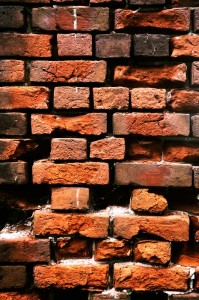Bricks or stones of masonry chimneys are held together with mortar, a mixture of water, sand, cement, and lime. Mortar is a durable substance, but even it can degrade after years of exposure to the elements and combustible materials. The process of removing and replacing degraded mortar in chimney joints is called repointing.

A chimney sweep will recommend repointing when the chimney mortar has cracked, deteriorated, or is missing. If the mortar is not replaced, outdoor moisture can penetrate the chimney wall. It will expand and contract during freezing and thawing cycles, causing additional deterioration to masonry. A process called efflorescence may occur in which salts become crystallized and degrade the masonry.
Repointing should only be performed by a professional because there is a particular way to do it. Degraded mortar joints must be prepared to accept new mortar and the mortar must be mixed in a special way. When the mortar is applied, the amount of water transferred to the masonry should be controlled. Special tools and techniques are used to compact the mortar firmly into mortar joints. The repair should be performed when extreme humidity, temperature, sun, and wind are not anticipated.
If a chimney is initially repointed incorrectly, the process must be repeated, incurring additional time and expense. Incorrect repointing results in mortar that is too hard, does not match, or does not permit the escape of water vapor, causing masonry to crumble. A custom mortar mixture is required and only an experienced chimney mason knows how to create this.
Chimney repointing is an important part of chimney maintenance. If it is not performed correctly or when recommended, the chimney will degrade and may erode long before it should. Having this early repair costs much less than having to restore the entire chimney. Have a chimney inspection performed annually to identify whether repointing is necessary.
